Here are the seven longlisted writers for this year's Golden Boabab Prize for Picture Books:
 Katherine Graham - A wordsmith by profession, Katherine fills her days writing articles for magazines and looking after her two boys, husband and ginger cat. She started her career as an economics reporter for the South African Broadcasting Corporation and, after a gap year in the UK and a brief interlude as a primary school teacher, has remained in the world of media ever since.
Katherine Graham - A wordsmith by profession, Katherine fills her days writing articles for magazines and looking after her two boys, husband and ginger cat. She started her career as an economics reporter for the South African Broadcasting Corporation and, after a gap year in the UK and a brief interlude as a primary school teacher, has remained in the world of media ever since.
Katherine says, "I am delighted to be selected as one of the finalists for this prestigious competition. It's such a wonderful idea to be focusing more attention on African children's literature. African children need stories that reflect their unique circumstances and celebrate the wealth of beauty on this continent."
The Lemon Tree: A rainy day is the perfect time to make pancakes, or so Gogo thinks, although would you believe there is no flour, eggs or milk left in the house? Lungi and Sipho are sent off to find the missing ingredients, making sure they take some lemons from their tree to distribute to their kind neighbours. A gentle tale with a slight twist at the end which perfectly illustrates the uniquely African concept of ubuntu
 Myke Mwale is a Zimbabwean and member of the Dominican Order, just finished his studies and currently teaching in Kroonstad, South Africa. He is also a contributor to the Weekend Witness, a newspaper based in South Africa.
Myke Mwale is a Zimbabwean and member of the Dominican Order, just finished his studies and currently teaching in Kroonstad, South Africa. He is also a contributor to the Weekend Witness, a newspaper based in South Africa.
Myke remarks, “Great stuff! I am flattered to be longlisted amongst the story listeners and tellers of our children’s imagination and reality”.
The Big Ball: It all started one afternoon when Chiedza asked to join in and play soccer with the boys. Girls do not play soccer with boys. However, Chiedza persists and soon she can kick the plastic paper ball just like the boys. A few days later, Tendai’s father buys him a real big ball. Everybody is excited to play soccer with Tendai’s ball. Will Chiedza play this new big ball? Only Tendai, the owner of the ball, can decide this.
 Mandy Collins is an award-winning South African journalist who has always had a passion for language, and in particular, the multilingual environment of South Africa. Mandy is involved in many aspects of writing. She also provides individualized writing coaching for children and adults. Mandy lives in Johannesburg, South Africa with her family and two slightly demented dogs.
Mandy Collins is an award-winning South African journalist who has always had a passion for language, and in particular, the multilingual environment of South Africa. Mandy is involved in many aspects of writing. She also provides individualized writing coaching for children and adults. Mandy lives in Johannesburg, South Africa with her family and two slightly demented dogs.
According to Mandy, “I am absolutely thrilled to be longlisted again for a Golden Baobab Prize. I had such fun writing and researching the story, and writing it in verse. I absolutely love the idea of promoting authentically African literature for children, written by Africans from every country, and every walk of life – it’s so important to create a culture of reading in our children.”
There’s a Hyena in my Kitchen: Juma is something of a fussy eater, and when he pushes his plate away one evening, the food uneaten, his mother warns him that he will have to eat the food for breakfast the following day. But in the morning, the food is gone, and they realise they have a hyena in the kitchen. Three times they chase the hyena away, but each time it returns to eat Juma’s leftovers. Juma is starting to get hungry, so he devises ways to trap the hyena. But the hyena is wily and nimble, and it escapes. Finally Juma finds the solution: he eats his dinner, and the hyena slinks off into the night.
 Charles Kwame Aidoo is the founder and manager Inkfluent; which has over the years collaborated with National Theatre, People of Equal Thoughts and Ehalakasa on several projects and events including poetry, arts and cultural festivals, open mics, flash mobs, slams and workshops in Ghana.
Charles Kwame Aidoo is the founder and manager Inkfluent; which has over the years collaborated with National Theatre, People of Equal Thoughts and Ehalakasa on several projects and events including poetry, arts and cultural festivals, open mics, flash mobs, slams and workshops in Ghana.
Kwame says. “I am quite new to the art and hereby acknowledge that Golden Baobab’s master-class for writers of children's stories which featured Mamle Wolo has sharpened my quill in this direction. I am happy to be included on the long-list of the 2014 Golden Baobab Prizes and look to achieve more with my works.”
The Tale of Busy Body Bee: It is a story about two friends - Ant and Bee. There was drought and Ant always worked himself out to produce enough but whenever he brought the harvest home, he would wake up to an empty stock. An advice from the wise Kwaku Ananse led Ant to add a magic pea to the subsequent harvest that got stuck in mischievous Bee’s tail.
 Shaleen Keshavjee-Gulam was born and grew up in Nairobi. Her current occupation is a Property Developer, both commercial and residential. She is the creator and an administrator of "Kilimani Mums", a popular social media support group for Kenyan Mothers. Shaleen lives in Nairobi with her husband and two daughters. She enjoys writing, especially for children.
Shaleen Keshavjee-Gulam was born and grew up in Nairobi. Her current occupation is a Property Developer, both commercial and residential. She is the creator and an administrator of "Kilimani Mums", a popular social media support group for Kenyan Mothers. Shaleen lives in Nairobi with her husband and two daughters. She enjoys writing, especially for children.
Describing how she felt when she received news she had been longlisted for the Golden Baobab Prizes, Shaleen says, "I was absolutely thrilled and incredibly honored."
Malaika's Magical Kiosk: Michelle is not a very happy little girl. Her mother has gone away to take care of her grandmother and left her with her bossy big sister. Everyone in the village is bad tempered because the rains are late and the food crops may die. But then a mysterious stranger arrives and sets up wonderful kiosk. There is a change in the air and incredible things begin to happen.
 Portia Dery is writer/blogger, a community development worker and social entrepreneur with focus on writing activities in Ghana. Her love for books has dared her to become a writer. She enjoys gardening and meeting people.
Portia Dery is writer/blogger, a community development worker and social entrepreneur with focus on writing activities in Ghana. Her love for books has dared her to become a writer. She enjoys gardening and meeting people.
“Thank you Jesus, I shouted to my walls. I thought things like this happen to people on magic lands, perhaps I drunk some magic potion. Very excited to contribute to African children’s literature but the real joy would be when a child picks up my story to read and smile with satisfaction at the end. That would be sheer bliss!” Portia exclaimed when she received news she had been longlisted for the Golden Baobab Prizes
Grandma’s List: Everyone has problems but Fatima an eight (8) year girl has the biggest, she is tired of been treated as a child. For a long time now she has been looking for an opportunity to show everyone especially her family that she is smart like any other grownup…and then the day arrives when Fatima has the change to be a superwoman and save the day! She gets the opportunity to run errands for Grandma from grandma’s list of to-do-things and waits eagerly to be praised but things turn out differently and she learns an important lesson.
 From Kenya is Aleya Kassam. Aleya is a writer, performer and storyteller. She is the co-creator of the Storymoja Publish Your Own Book series (which has published over 300 children); she delights in finding new ways to excite children about writing and exploring stories.
From Kenya is Aleya Kassam. Aleya is a writer, performer and storyteller. She is the co-creator of the Storymoja Publish Your Own Book series (which has published over 300 children); she delights in finding new ways to excite children about writing and exploring stories.
Aleya says, “I am absolutely thrilled to be part of a movement that celebrates African Children's Literature. My hope is that kids around the Continent will have an abundance of incredible, juicy, fantastical, thrilling stories to read, stories that they see themselves in, that speak of their reality, their dreams, their worlds; and that this will drive an insatiable appetite for reading, just for sheer the pleasure of it!”
The Jacaranda Tree is about little Zawadi's quest to make her father smile again, after her mother passes away. The story is about a young girl, grappling with the death of her mother, and calling out to Nature to help bring happiness back in their lives. When Zawadi asks The Jacaranda Tree for a favour, she doesn't realize the consequences may be permanent.
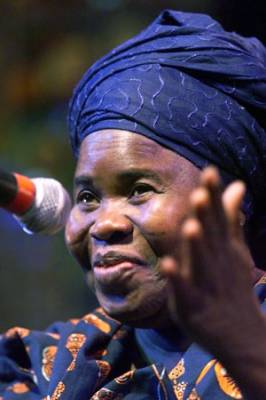
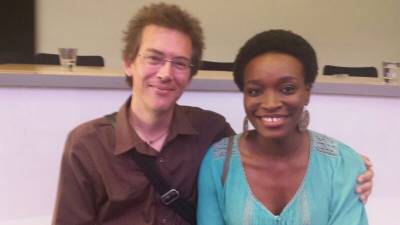
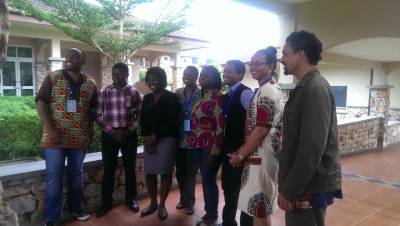
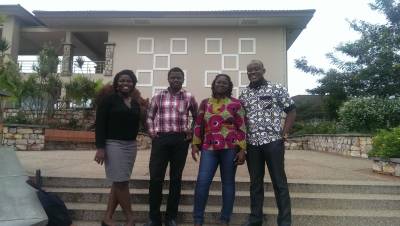
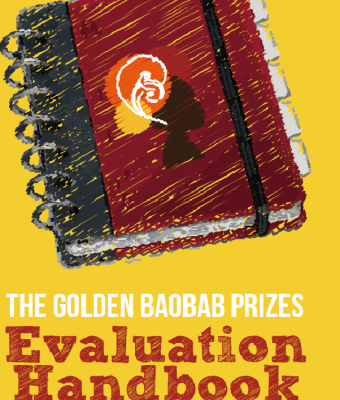 Golden Baobab has begun evaluating stories for the 2014 Literature Prizes. This year, the Prizes received a total of 210 stories from 12 different countries across the continent. The reading season of the evaluation process is in its third week.
Golden Baobab has begun evaluating stories for the 2014 Literature Prizes. This year, the Prizes received a total of 210 stories from 12 different countries across the continent. The reading season of the evaluation process is in its third week.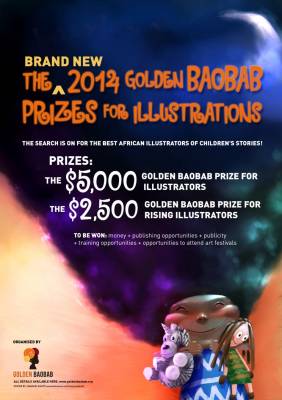 Great news for illustrators, artists and designers in Africa!! Golden Baobab has extended the deadline for submissions to the 2014 Golden Baobab Prize for Illustrators. The new submission deadline is Midnight GMT, Friday, August 22, 2014.
Great news for illustrators, artists and designers in Africa!! Golden Baobab has extended the deadline for submissions to the 2014 Golden Baobab Prize for Illustrators. The new submission deadline is Midnight GMT, Friday, August 22, 2014.